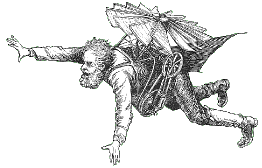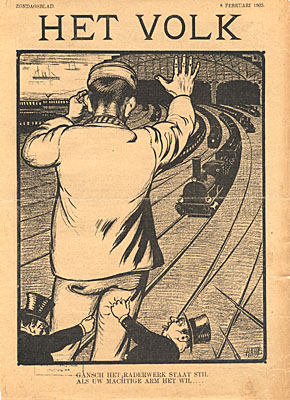| Gothic Steam Phantastic > Information > Punked |
 Punked |
 |
| -*- Home -*- Daleth-*- I&I RPG -*- Information -*- Forum -*- Credits -*- Links -*- |
About punks, heroes and hidden agenda’s (part 1)A discussion that is held on a regularly base is the “where’s the punk in the steam?” question. Steampunk is often regarded as something that has nothing to do with punk. It is, after all, all about gentlemen in their clean mansions sipping tea while an automated butler does the dirty work for them. However, it seems that the romantic view of the Victorian Age has overgrown the initial idea of steampunk. Yes, steampunk is set in the steam age, that is largely covered by the Victorian Age, and, sadly, that was the age the British Empire did not only rule the waves but also the rest of society and culture and formed the base for modern “steampunkians”. But Steampunk is a fucked up genre, it is about modern or even future times and technology put into the background of that Victorian Age. It makes a lot of things possible. Cloning the Queen, who then by right can say they are not amused, putting starships over London, having gnome-tech in the factories of Leeds and Birmingham. But that would just be crossovers of fantasy and Victorian fiction, or science fiction and Victorian fiction. It doesn’t support the name steampunk, even though many steampunks might like the genre of Victorian fiction. Anarchy in the UK No doubt that steampunk was named after cyberpunk, which got it’s name from the punk-movement of the 1970s, which in turn got the name from the scum of the streets in earlier times. How the punks of the 1970s got their name is not quite clear. What they did and stood for is much better known. There were, in a rough way, three different movements among the first punks:
What one has to know from the punk movement of the 1970s, is that it were the people from the working classes that made their statements against the upper classes. Cyberpunk At the end of the 1970s and in the early 1980s, cyberpunk was born. It was exactly what the name says, even though “cyber” might not have been the right choice of words, but alas. Cyber was at that time no longer related to scientific cybernetics (studies of human movements), but had to do with anything involving computers, from virtual reality to robots and from networks to military defence. In fact, ever since the ZX Spectrum PC, computers where hot, and popularity grew with the cheaper and better Commodore 64. They made their way into modern culture in pop-music, movies (like TRON), and literature. Young, clever people switched from telephone-hacking into computer-hacking, ever wanting to control modern techniques and use it for their own ends. This hacking was not “breaking into the computers of the large corporations”, but rather using the computers for something they were not really invented for. However, if you wanted to work with real good computers, you needed a good one, and the best could only be bought by the corporations. When a network was available, one could work on such an expensive terminal from ones own bedroom, using modem and (hacked) telephone line. What happened was in fact that those who knew all about modern techniques, about computers and how to operate them, where the working class, while the computers were actually owned by the upper classes. This tension between the classes is the basics of may cyberpunk stories, and recalls the attitude of the punks from the 1970s. Furthermore, it was nearly 1984 and people were a bit afraid of the computers, that stored everything, but you never knew what except for the fact that big brother, or rather the system operator of the large computers in the companies, were watching you. Hackers could unveil the hidden agenda’s of the corporations. Mirrorshades The cyberpunk movement is close related to the neo-gothic (or doom) movement of the 1980s (that had its roots in punk). It is also very much tied to the time it came into existence. The cold war was a fact you could not deny, the possibility of either Pershing-2 or SS-20 nuclear rockets flying over Europe was something not unimaginary. There were spies, counter-spies and well-defined enemies, and dangerous targets like nuclear reactors that, by the way, would cause problems during a meltdown even without a war, was we have seen in Chernobyl. People where informed on national TV about what to do in a nuclear war and the winter following it. In the early 1980s there was also a lot of unemployment, while prices for oil and silver went up and with it, prices of many other things. Pollution was on the agenda of every European nation. Computer-networks were mainly there for military “defence”, to control the world and especially that red button everyone was afraid of. This is the background of cyberpunk. It is much like the genius Frankenstein who was afraid of the monster he had created because he had not foreseen the power of it. In fact, ever since fire was stolen from the gods, people have been afraid of techniques.
The tension in steampunk is basically brought down to the slogan of the Dutch socialist movement during the railway strike of 1902: All of the system grinds to a halt when your mighty arm wishes so “Gansch het raderwerk staat stil als uw machtige arm dat wil” The Steampunk and the Steampunkians How far has steampunk drifted from its roots. No longer is the socialistic struggle of the poor against the establishment, against Big Brother and against the unfair Empire a theme in steampunks. Steampunk-fans call themselves steampunkians if they feel the word punk is too dirty, too gritty, too unsophisticated. Now every genre in every kind of art that reminds of the nineteenth century is called steampunk. In fact, the basic genre of fantasy or science fiction (the “What if...?” genres) is largely forgotten when steampunkians collect real Victoriana and try to get into some historical correctness, which steampunk by definition hasn’t. Of course, dreaming of your own empire, your own palace (like Strawberry Hill) or Mansion on your own Estate, where you can live in luxury with your own staff is appealing. But it’s just no steampunk to me. To be continued.... © Yaghish 2007 Want to give your opinion on this? |
| -*-© Steammasters 2003-*- |
| ^ Up |
